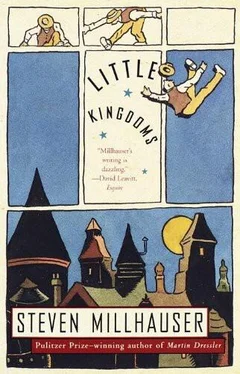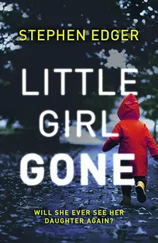On weekends when Max visited, he and Cora and Franklin and Stella took long walks on country paths, had picnics in the woods, played croquet in the front yard, and drove to a landing ten minutes away, from which they took a small ferry across the river to the wooded hills on the other side.
“Stel’s been talking about death,” Franklin said one night. “I think she’s lonely. I’m away all day, and she doesn’t really have any kids her own age to play with.” He and Cora and Max were sitting on the open porch, despite a chill in the air.
“Death,” Max said. “A woman after my own heart. You know, I’ve seen two new bulldozers in those hills since my last visit. People are buying land up and down the river. In twenty years you’ll be living across from Chicago.”
“God, I love it up here sometimes,” Cora said, shaking back her hair and drawing her sweater close.
“The only land I’ve ever owned,” Max said mournfully, “is in a flowerpot on a window ledge on East Twenty-third Street.”
“Well,” Cora said, “we’ve all got to start somewhere,” and Max burst into high, nervous laughter.
The weekend outings, the lazy evenings, the hours in the sun, the self-banishment from the tower study: Franklin had to admit that it was all having an effect, that he had never felt better in his life. In the mornings he rose before the rattle of the milk bottles and, filled with a kind of energetic serenity, went downstairs in the bird-loud dark, showing its first streak of gray, to put up a pot of coffee and prepare fresh orange juice. He sliced the plump Florida oranges in half on the breadboard, pressed the juicy halves firmly against the upthrust knob of the juicer, and carefully checked for pips. Freight cars loaded with slatted boxes of oranges picked from sun-drenched trees in orchards in Florida had rushed through the night at sixty miles an hour, through Georgia, the Carolinas, Virginia, all the way to the state of New York, where husky men with bulging veins in their upper arms had loaded the boxes onto trucks and driven them to country stores in northern villages, solely in order that he, Franklin Payne, could buy one dozen sun-ripened oranges and stand in his kitchen to make fresh orange juice for his wife and daughter. It was all astonishing, as astonishing as the milk that arrived in clear glass bottles every morning, with the cream clinging to the top, or the brightening air that poured through the large windows in their solid oak frames — yes, the whole world was simply pouring in on him. Soon he would make a breakfast of soft-boiled eggs, sputtering bacon, and toast with butter and apple jelly, and later, in his office, he would work hard, but not too hard, so that he would finish by the end of the day; and in the warm evenings he would walk with long strides, taking in the dark green scents of early summer. His body was trim, his step light, the skin of his cheeks and neck radiant with weekend sun and air; and at night he had begun to visit Cora in her room again.
As his health returned, as his energy increased, Franklin sometimes felt a touch of restlessness. In the warm summer evenings, sitting on the front porch as the last light drained from the sky and the green hills turned black beyond the darkening river, he would feel a vague regret, a wistfulness; and somewhere far back in his mind he would have the sense of an inner itching, as if he were on the verge of remembering a word that kept eluding him. Then he would get up from the porch glider and go inside, letting the wooden screen door slam behind him; and in the lamplit parlor he would look at the mantelpiece clock, flanked by a glass-covered oval photograph of Cora’s parents and a glass-covered photograph of Stella, in matching pewter frames.
One night Franklin woke beside Cora and sat up in bed. His heart was beating rapidly; the remnant of a dream floated just beyond his inner sight and vanished. The muscles of his legs itched. Through the screen beneath the raised shade the night sky was deep blue. Franklin slipped out of bed, glanced at Cora, and stepped out of the room. He walked down the hall, opened a door, and began climbing the stairs to his tower study. On the dark landing he paused; his heart was beating wildly; his temples felt damp. Somewhere a floorboard creaked. For a long time he stood on the landing before turning back down the stairs.
“No no no,” Max said a few days later. It was a hot blue Sunday afternoon. “My lips are sealed. Not a word until we’re there.” The wheels of the Packard made snapping and crunching sounds as they passed over pinecones on the rutted dirt path. Through overhanging branches, sunlight fell in trembling patterns, rippling over Cora’s straw hat, glinting on bits of mica in granite rocks, sliding over foot-high tufts of grass that sprang from the dirt between the ruts. The ferry had carried the car across the river, and Max had guided them onto a hard dirt road that became narrower and bumpier, sprouting ferns, buttercups, clusters of Queen Anne’s lace. “This will do,” Max said, “this is fine, stop right here. Now follow me, one and all.” He led them along the vanishing dirt path, looking back impatiently. Suddenly he stopped and stepped into the woods. “Come on, come on, you lazy city slickers, get a move on, shake a leg. Watch it, we’re coming to a stream. Easy now. Easy does it.” After a while he stopped and held out his arms. “Well? What’s the verdict?”
“A nice spot for a picnic,” Franklin said. “We could sit in that oak tree.” Through the trees he could see the river below and, half a mile downriver, the village of Mount Hebron.
“Humble,” Max said, placing a hand over his heart, “but mine own. Three and a half acres of pinecones and fungus.”
Cora clapped her hands. “You’re not serious, Max! You’re not serious!”
Franklin said, “Do you mean to tell me—”
“It cost me an arm and a leg, let me tell you.” Max shrugged. “But I figure I’ve got two of each. I think of it as an investment. A larger flowerpot. Hey, Stella Bella, look: see this pebble? I own it. That leaf’s mine.”
“This calls for a celebration,” Franklin said, patting his pockets over and over again, as if he expected to find a corkscrew.
Two days later Max sat in Franklin’s office, his legs outstretched, his left arm hooked over the back of the chair, his right hand rippling through the air. “I feel like a kid with a new train set, Franklin — only my trains are trees. Is this crazy? It’s not even Wednesday and I’m counting the hours till the weekend. This place doesn’t help. Monday morning I don’t even have my hat off and already there’s a note on my desk. From the Troll himself. You know who Alfred the Fat is? I’ll tell you who he is. He’s the fat little drip-nose kid we all knew in the third grade, the one whose pants were always getting stuck in his behind. Now he’s sitting behind a desk and making us pay for knowing what we know about him. I’m telling you, one of these days — one of these godforsaken days — and take a look at this place, will you? Look at it. It’s like working in a loony bin designed by one of the resident loonies. Christ, I’m raving. I’ve got a deadline.” He stood up. “You have a good life, Franklin.” He turned abruptly and left, rattling the blinds.
Franklin disliked being told that he had a good life — for some reason it made him feel that he didn’t have a good life at all — and he disliked Max’s abuse of Kroll because it had the effect of making him rise secretly to Kroll’s defense, and he preferred not to be nudged into Kroll’s camp against his will. His own work for Kroll was going well. For the revived Cincinnati strip, now called “Dime Museum Days” in honor of the popular animated cartoon, Franklin changed Danny to a girl and brashly borrowed incidents he had invented for the film. There was a daily black-and-white version and a separate Sunday one in color. Moreover, the daily strip was no longer closed, but continuous: a long adventure, each day’s installment ending in a suspenseful sixth panel, with an occasional small resolution and the introduction of secondary characters, who replaced the rather passive heroine from time to time in adventures of their own that took them to new rooms of the museum. Franklin worked swiftly, scarcely revising a line; the strip proved popular, although he knew that the drawing was inferior to that of the original strip, the situations less surprising and original, the whole thing hopelessly uninspired. Kroll had canceled “Figaro’s Follies” and rejected each of the new strips Franklin had invented to replace it; he was urging Franklin to create a strip in a more realistic vein to replace the old “Phantom of the City.” After several failed attempts, including a humorous domestic strip in which the husband stayed home with the baby while the wife worked as a newspaper reporter, and a mischievous-kid strip in which the real culprit was the cute little dog, Franklin returned to an idea in one of the late Phantom strips, replaced the Phantom with a likable street urchin with a patch on his pants, and set the strip entirely underground, in the subway and its tunnels. It was a continuous strip, in which the boy had a series of menacing adventures in subway cars and in the system of tunnels under the city; the settings were precise but verged on the fantastic. Kroll was pleased, though he insisted that Franklin name the boy Sammy and the strip itself “Subway Sammy.” Franklin had suggested “Adventures in Underland.”
Читать дальше












